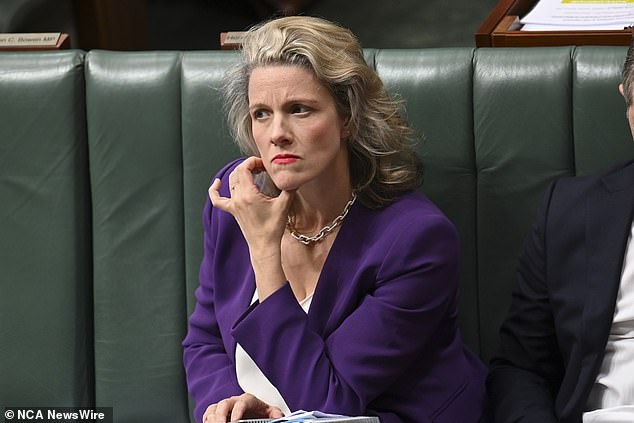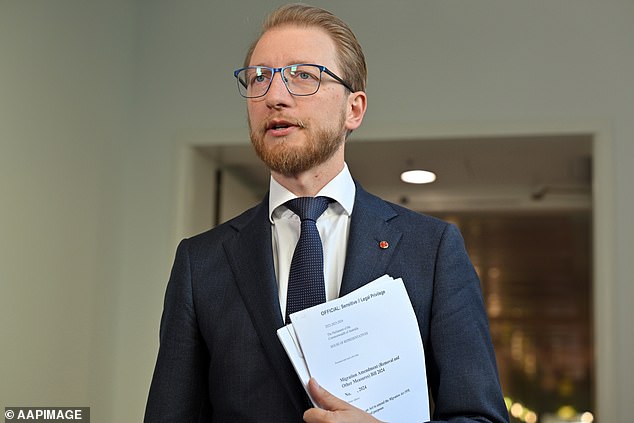<!–
<!–
<!– <!–
<!–
<!–
<!–
Federal parliament has passed new accelerated detention laws, meaning asylum seekers who refuse to be deported could face up to five years in prison.
The new legislation rushed to parliament on Tuesday afternoon ahead of an upcoming High Court decision on indefinite detention and was passed in just over two hours.
Opposition immigration spokesman Dan Tehan described the government’s actions as “an ultramarathon of incompetence.”
“We should have time to consider that (legislation),” he said in response to the introduction of the new laws. ‘We should have time to debate that! And examine it.
However, the vote in the chamber was 102 in favor and 13 against.
A leaked explanatory memo to the bill stated that changes were needed to “strengthen the integrity of the immigration system” by making it easier to deport immigrants.
It will give Immigration Minister Andrew Giles powers to order asylum seekers and other migrants to “do specific things” that would make their deportation easier.
Citizens of countries that do not accept deportees from Australia could also have their visa applications barred in a bid to encourage cooperation from other nations.
Introducing the legislation to parliament on Tuesday, Giles said the government was committed to strengthening Australia’s immigration system.
“Make it better, stronger and fairer and ensure it works in Australia’s national interest,” he said.
“We need these important tools to strengthen our immigration system.”

The Government’s Home Affairs Minister Clare O’Neil came under fire this month after it was revealed she relied solely on verbal advice for the High Court’s previous ruling.


Opposition Home Affairs spokesman James Paterson said it was a “rushed repair job” to get the new legislation passed.
The Labor Party faces another High Court challenge as an Iranian national known as ASF17 makes a legal bid for freedom.
The Albanian government has attempted to send him back to Iran, but as a bisexual man he could face the death penalty upon his return.
If an earlier High Court ruling, which found indefinite detention illegal in November, is extended to cover people who refuse to cooperate with Australian authorities, the Iranian would be freed and more refugees could be freed.
The government has been drafting legislation since Friday to try to get ahead of the court’s April 17 ruling.
“The lack of cooperation with removal proceedings demonstrates a disregard for Australian law,” the memo says.
Opposition home affairs spokesman James Paterson said the coalition had been given just over an hour’s notice that the Commonwealth intended to introduce the legislation to parliament on Tuesday.
This gives them about 36 hours to approve the legislation if it is to be done before the end of the session week, the last before the High Court decision.
“Perhaps if it were in response to a genuine and urgent crisis it would be fine, but this is an extraordinary demand that we must make of Parliament, of all of us,” Senator Paterson said.
Opposition immigration spokesman Dan Tehan also condemned the government’s “lack of transparency” but neither divulged details about the bill, saying it was up to the relevant government ministers to “do their job” and reveal the legislation.
Greens leader Adam Bandt called the government’s approach extraordinary.
“Nothing has been put forward to justify us losing the usual rights that everyone in this parliament has to consider such important legislation,” he said.
Warringah MP Zali Steggall said she was “deeply disappointed” that Labor was trying to pass legislation quickly without allowing enough time to seriously consider the implications.
“Shame, shame on all members of the government for supporting… something that is deeply undemocratic,” he said.
The government’s response is similar to the fallout from the High Court NZYQ case when indefinite detention was declared unlawful.
About 150 immigrants were later released into the community.
While some had serious criminal convictions, including for murder and rape, others faced less serious charges and all served their time behind bars before being placed in immigration detention.

